This week’s Roundup is sponsored by Trike Fest, coming to Portland June 15th. If you’re curious about riding in a more laid-back style, you might love trikes. They’re fast and fun!
Happy Monday. Hope you had a good weekend. I had to make an unplanned visit down to Medford to be with my dad (again) in the hospital, so I missed all the Parkways fun. Looked like a great day and I can’t wait for the next one.
Here are the most interesting stories our community has come across in the past seven days…
Street Wars: As New York City gears up to implement America’s first ever congestion pricing system, this new column will set the table and share the perspectives that have shaped streets in the Big Apple. Who will win the war? (NY Times)
Going fast: There are a lot of factors at play in the ever-increasing speeds of drivers on our roads, and it will take more than just lowering speed limits to get them to slow down. (Vox)
E-bike regulations: A public policy expert makes the case for federal e-bike regulations to lessen confusion for consumers and bike makers. (Streetsblog USA)
Death by cycling: A new law in the UK would make causing the death of another person while cycling a major offense with a prison sentence of up to 14 years. Some lawmakers say it’s needed to hold riders accountable while advocates say it’s a distraction from more serious issues. (BBC)
Nice legs: Move over helmet wars, there’s a new debate to be had: Who has stronger legs? Runners or cyclists? (Runners World)
Dedicated riders: Another study, this time by retailing giant REI, shows that a lot more people would give cycling a try if we offered them a network of safe lanes to do it in. (Momentum)
TriMet’s comeback: Ridership numbers are looking good for TriMet and the agency points to their post-Covid “Forward Together” route revamp as the reason. (Portland Tribune)
Big car, big ticket: Montreal charges mega-cars more to park in residential areas, a move that is being hailed as one tool to combat “car bloat” — the annoying and unsafe trend of massive cars using more than their fare share of city streets. (Bloomberg)
Confronting road deaths: I like the idea floated by a road safety advocate in Washington that DOTs should treat the fatal crash crisis as a megaproject that must be funded and approached with the same political urgency as a freeway expansion project. (Seattle Times)
Thanks to everyone who sent in links this week. The Monday Roundup is a community effort, so please feel free to send us any great stories you come across.



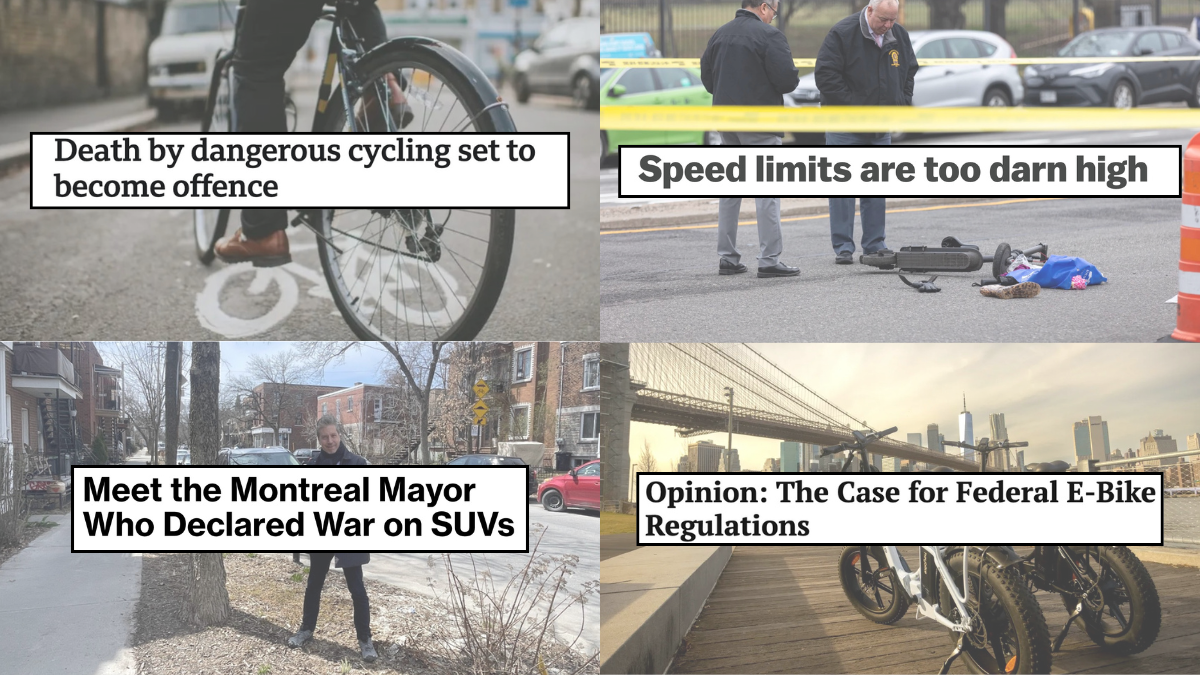

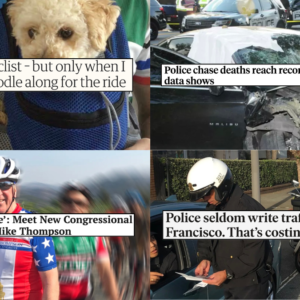
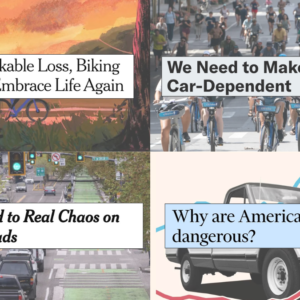
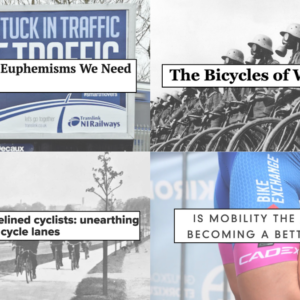
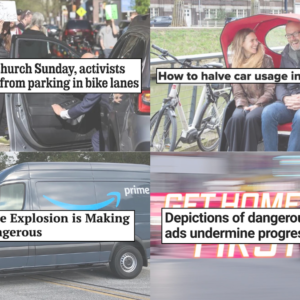
Thanks for reading.
BikePortland has served this community with independent community journalism since 2005. We rely on subscriptions from readers like you to survive. Your financial support is vital in keeping this valuable resource alive and well.
Please subscribe today to strengthen and expand our work.
In the push for Federal regulations on ebikes I’m reminded that it was Federal regulations on automobiles that directly gave rise to the current bloated insane SUVs and trucks. I am not convinced that federal regulations will give the right results.
https://www.vox.com/future-perfect/24139147/suvs-trucks-popularity-federal-policy-pollution
(as is the new norm with modern writing, it takes several paragraphs for the author to get to the crux of the issue)
https://www.reuters.com/article/idUSKBN21D1KK/
Yes, the so-called “light truck” exemption making SUVs more profitable through lowered environmental standards is a problem. On the other hand, federal regulations were also behind mandatory seat belts, airbags, and anti-lock brakes, all of which improve safety (for those inside the car at least). In other words, good regulations are good while bad regulations are bad. No surprise there. Both the linked articles stress that it was corporate lobbying that shaped the SUV loophole in the first place.
I very much doubt that most ‘murricans (and especially corporate “citizens”) see this as a crisis.
* 1.1 million people die of COVID-19 in the USA
Average ‘murrican: it’s just the flu
* ~44,000 people die from gun violence in the USA
Average ‘murrican: my 2nd amendment rights are more important
* ~41,000 people die from traffic violence in the USA
Average ‘murrican: accidents happen, nothing to be done about it
The “Street Wars” article is behind a paywall. Can somebody copy/paste it here?
Internet Archive helps: https://web.archive.org/web/20240519181605/https://www.nytimes.com/interactive/2024/05/13/nyregion/nyc-traffic-congestion-pricing-parking.html
The suggestion mentioned is excellent. I also have an alternative method that I’d like to share with everyone. It’s part of my daily routine…
Archive.is:
https://archive.is/https://example.com/articleI think the proposed Streetsblog e-bike regulation is spot on. 20mph on paths is easily doable for roadies, and represents an upper bounds of reasonable bicycle speed on that kind of facility.
Also, the “three classes” system is beyond confusing and needs to be replaced with something that clearly defines and regulates the faster, moped style vehicles with no need for pedaling.
I know getting anybody to police anything is hard these days, and gray market tech makes a mockery of us all, but we need to start somewhere.
Agreed, it is hard for me to argue that the speed limit on a residential street should be 20 mph for cars, but it is somehow okay for bicycles (electric or not,) to ride a couple feet from a pedestrian on a shared use path at a higher speed than that…
Regarding Trimet:
Since breaking my arm last month (jackhammered my arm into a pothole while commuting into town on SE 17th), I’ve been riding Trimet a lot.
It’s highly improved since I last tried commuting, in the fall of 2022! I’ve experienced cleaner trains and no disruptions/delays. I hope they keep up the improvements.